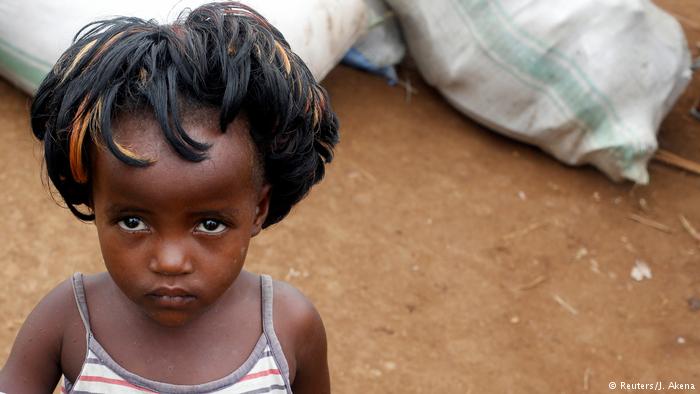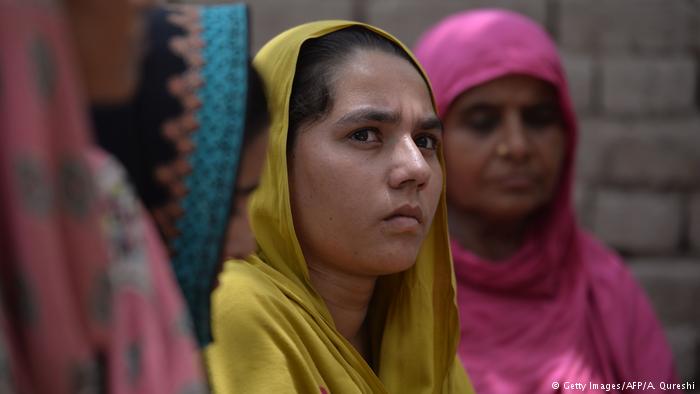Pakistan child rape and murder case ‘just tip of iceberg’

The rape and murder of Zainab Ansari, a seven-year-old Pakistani girl, have shocked the country. People demand justice for the girl’s family, but there isn’t much discussion on the issue of child protection in Pakistan.
In the eastern city of Kasur, people are protesting lack of progress in finding those responsible for the kidnapping, rape and murder of seven-year-old Zainab Ansari. At least two people have died during violent clashes between police and protesters.
The country is in a state of shock, with social media flooded with messages of solidarity with Zainab’s family and anger at the provincial government of Punjab. Vigils and demonstrations are being held in all major Pakistani cities.
Zainab disappeared last week while returning from a Quranic studies class to her aunt’s house; her body was found in a pile of garbage on Tuesday near her home in Kasur in Pakistan’s Punjab province. She was the eighth child to have been found raped and murdered in Kasur over the past year, according to a police official anonymously quoted by AFP news agency.
“I have no information about any arrest in my daughter’s murder case,” Zainab’s father Amin Ansari told Tanvir Shahzad, DW’s correspondent in Lahore. “I demand that the government arrests the culprits and punish them so that other young girls don’t meet the same fate,” Ansari added.
“We are now afraid of letting our children leave the home,” Ansari said in televised comments. “How was our child kidnapped from a busy market?”

Protests in Karachi, for seven year old girl Zainab who was raped and killed in Pakistan.
In August 2015, Kasur came to the world’s attention via a child abuse and extortion scandal involving at least 280 children who were filmed while being sexually abused by a gang of men. The men then blackmailed the children’s parents by threatening to release the videos. The scandal sparked countrywide condemnation and anger against authorities.
On Thursday, the body of a 15-year-old girl, who was allegedly raped and murdered, was found in the city of Sargodha, Pakistan’s Dawn newspaper reported.
After every incident of child abuse, the debate in Pakistan focuses on the government’s inefficiency to act against the perpetrators of the crime. What is missing from the discussion is the larger issue of child protection in Pakistan.
Child protection education
Maria Rashid, an Islamabad-based psychologist and rights activist, says there is “no one solution to the issue of child sexual abuse.”
“Any effective response [to the issue] has to be multipronged and must include interventions such as more effective and specific legislation around sexual abuse of minors. The implementation of laws is equally important. It involves resource allocation, sensitization and training of law enforcement agencies, health and legal officials, as well as child protection information for parents, schools and children themselves,” Rashid told DW.
“Children are vulnerable to sexual abuse all over the world. In Pakistan, the dynamics that make them vulnerable are two-fold: impunity for perpetrators, which is reflective of the overall weak and easily manipulated criminal justice system compounded by low priority given to crimes of this nature by authorities; taboos around issues related to sexuality and the tendency to confuse child protection information with sex education as a result of which children are vulnerable to sexual violence and predators,” Rashid underlined.
While cases of brutal murders and rapes of minors often catch people’s attention, domestic sexual abuse of children, which activists say is widespread in Pakistan, is generally a tabooed topic in the country.
“A larger number of survivors of child sexual abuse suffer in silence as they do not have the language to describe what is happening to them. Zainab’s case is just the tip of the iceberg,” Rashid said.

Talking about sexual abuse is a taboo in Pakistan
Rampant abuse
“Child abuse takes place in almost all parts of Pakistan. Kasur has been in the spotlight because such cases were reported there in the past,” Manizeh Bano, director of the non-governmental organization Sahil, told DW.
“Kasur is particularly exposed to such crimes because child labor is also rampant in the city. Those involved in abusing children feel they can get away with their crimes,” Bano added.
Women rights activist Mumtaz Mughal says the government wakes up to such cases when they are reported in the media, but hasn’t done anything to introduce legislation and mechanism to prevent child abuse.
Pakistani rights activists say they had put forward a number of suggestions to the government after the 2015 child abuse scandal in Kasur, but authorities haven’t implemented them.
“Finding Zainab’s killers must be an important priority for authorities, especially as in this case it seems that this is not a lone incident in this area and other children are at risk,” activist Maria Rashid noted.
“Sadly, after initial media hype and response to rape and child abuse cases by state authorities, people forget about them. There is no long-term redressal of the issue and it is treated more as an anomaly rather than a widespread problem that needs to be tackled at various levels and through sustained effort,” she stressed.
Author: Shamil Shams
Additional reporting by Tanvir Shahzad and Unbreen Fatima.
_____
WTO RECOMMENDS
Pakistani women join the #MeToo Campaign
Millions of women across the world have been sharing their experiences of sexual harassment and abuse in an online campaign using the hashtag #MeToo on Twitter and with rolling posts on Facebook. The hashtag has been trending in Pakistan too.
“All Women” Restaurant in Pakistan
Hamaida Ali Hazara belongs to one of the most persecuted communities in Pakistan, the Hazara community. She lives in Quetta, the capital city of Pakistan’s restive Baluchistan province. Hundreds of Hazaras have been killed in recent years.
Patriarchy and religious extremism challenged by a Pakistani woman
Gulalai Ismail, a Pakistani human rights activist from the Swabi district of Khyber Pakhtunkhwa, was recently awarded the Reach All Women in War (RAW) Anna Politkovskaya Award alongside the late Indian journalist, Gauri Lankesh.






